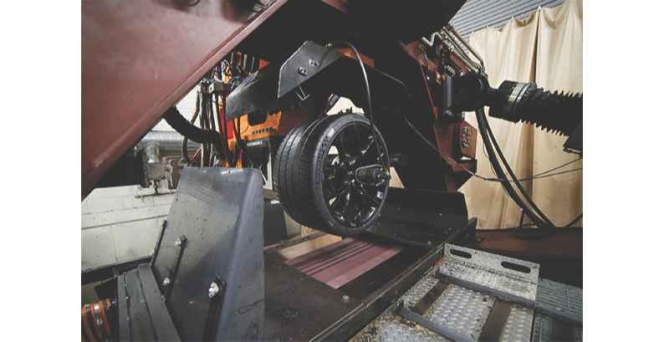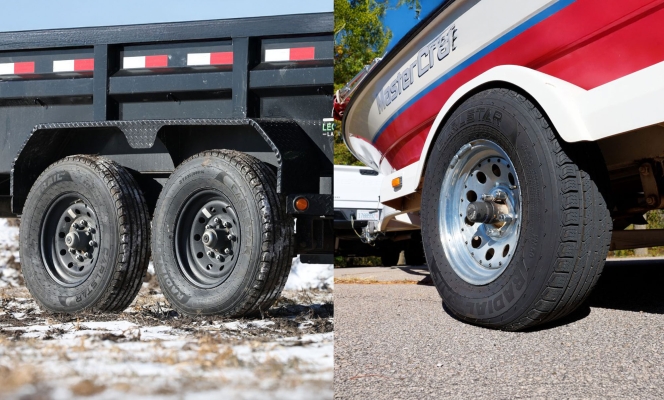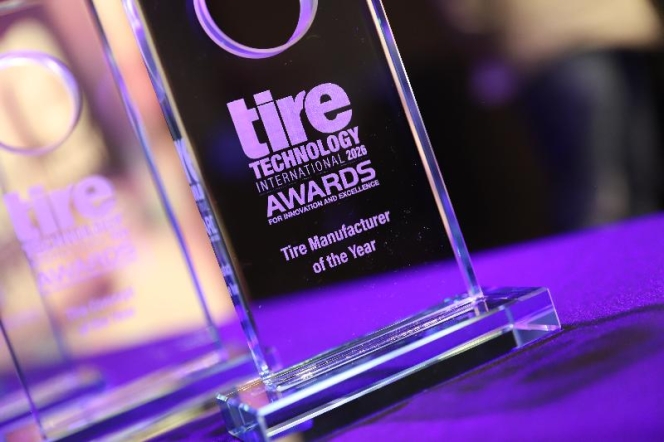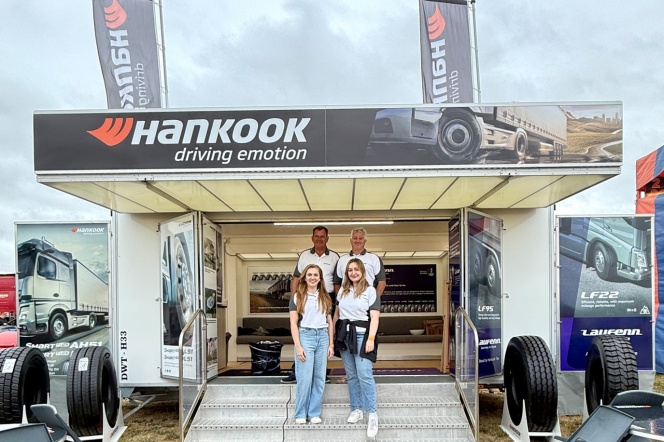- BorgWarner
- Joseph Fadool
- Continental Automotive Systems
- Ford Motor Company
- Charging Forward
- Frederic Lissalde
- Dr. Volker Weng
- Isabelle McKenzie
- Dr. Stefan Demmerle
- Henk Vanthournout
GCAPS TRe-The Most Capable Indoor Flat- Belt Tyre Test Machine
- By TT News
- August 20, 2021

GCAPS physical testing expertise has led to research and new modelling methods for improved products delivered to our customers, including global vehicle manufacturers, tyre manufacturers, and championship motorsports teams. These clients have used GCAPS modelling and testing services to elevate their performance in vehicle handling, autonomous vehicle technology, and many other aspects of transportation simulation. The ability to provide these services begins with the LTRe (Figure 1).

The LTRe was purpose-built with motorsports in mind. Infused with highly dynamic positioning rates, a maximum speed range of 320 kph, high force capabilities, and electric drives enabling driving and braking conditions throughout the entire speed range makes the LTRe the most dynamically capable machine globally. High spindle torque capabilities and overall size allow GCAPS to test heavier tyres such as light trucks and some commercial truck/bus tyres.
Until the establishment of GCAPS in 2012, the motorsports industry had been limited to either on-track or low-speed machine tests to quantify tyre response. On-track test methods are adequate for simulation validation but are often not comprehensive enough to measure pure tyre response due to vehicle dynamics interference and inconsistent terrains. Low-speed indoor methods will capture tyre responses, but speed limitations result in data extrapolation in trend analysis and tyre models at higher speed ranges. Increasing speed will affect the growth of the tyre, typically shown in loaded radius measurements, thereby changing the tyre’s contact patch dimensions and directly affecting the tyres force generation. This demonstrates the importance of measuring the tyre’s response throughout the vehicle’s operating domain. A tenth of a second in motorsports can mean finishing multiple positions behind the leader. Capturing accurate data at operating speed allows teams to optimize their performance and improve lap time. The LTRe provides such measurements to reduce speed sensitivity compensations in tyre models and measure the tyre’s response more accurately with a flat contact patch interface.
Another illustration of the LTRe’s dynamic capabilities is completing drive file replays (Figure 2). On-track or simulation data can be used as machine inputs to replicate vehicle manoeuvres. This test method can be used to validate tyre models, inform construction and vehicle setup analysis, or test the tyre’s durability. The LTRe is also instrumented with premium thermal measurement sensors (Figure 3) to capture the tyre’s outer and inner carcass temperatures to monitor the thermal state of the tire, develop thermal models, and improve lap-time predictions in simulation. GCAPS has developed a thermal logic algorithm, using customer-defined locations and temperature setpoints, controlling the tyre’s position in the test sequence until the defined setpoints of the tire are satisfied. This method ensures optimal and consistent temperatures are met before testing continues with the most efficient time, which inevitably reduces thermal variations in tyre response.

Heavy emphasis has been placed on vehicle simulations to improve the performance of handling, ride comfort, and safety. These areas are desired by customers and are required to comply with federal regulations. GCAPS Simulation group produces commercially available tyre models such MF-Tyre™, MF-Swift™, PAC2002, and FTire™. These models are widely known across the industry and used frequently in vehicle dynamics platforms. Utilizing their dynamic, thermal, and unique cleat capabilities, GCAPS has internally developed procedure methods aimed at improving the model’s fidelity which have been verified with the tyre model creators. These capabilities ensure and improve the robustness of these tyre models by offering dynamic test data to properly characterize the tyre’s response and match innovative vehicle maneuvers. GCAPS offers both testing and modeling at the same facility, which will improve modeling results, shorten lead times, and reduce costs. Additionally, GCAPS simulation team has the experience and industry leading expertise to generate tyre models that improve vehicle simulations and enhance the mobility industry.
Not all race events have ideal sunny and dry days. Many series will continue the race as rain occurs. To gain knowledge of the wet tyre response, GCAPS has developed a water delivery system that can apply a consistent water depth to the tyre for speeds up to 250 kph on its LTRe. Using the water delivery system, GCAPS engineers have developed procedures to not only determine a hydroplaning speed, but also how a tire performs for all conditions a vehicle may encounter on roads or racetracks. Using the LTRe coupled with the water delivery system, changes in tyre force generation are measured at various speeds, loads, cambers, pressures, and even water depth. This information provides insight into the tyre’s force generation differences, which can loop back into the stability and safety assessments in wet conditions of highway vehicles ADS technology, and motorsport vehicles. The methodologies developed by GCAPS have been used to quantify and improve the compounds and tread pattern designs of motorsport tires.
 Motorsport tyre design requires an in-depth knowledge of tyre response, irrespective of the vehicles their placed on. Pirelli faces a new challenge ahead of the 2022 season relative to tyre design, the new vehicle aero package coupled with a change in tire size from a 13-inch to 18-inch diameter wheel. With overall tyre diameter increasing from 660mm to 720mm (~3-inch difference), a reduction in sidewall height inevitable, requiring structural changes to the tyre to maintain current performance demands and removing the team’s ability to rely on historical data increase the challenges for understanding the tyre.. Teams use historical data through race events, practices, and testing to apply setup configurations to the car. Since there is no historical data for the new tyre designs, teams will rely on testing data from both on-track and laboratory environments. It is imperative that testing be performed at a facility containing the resources and capabilities to match conditions seen on track. GCAPS provides this framework to their motorsport’s customers by removing speed compensations, helping improve vehicle setup decisions, and optimizing overall performance.
Motorsport tyre design requires an in-depth knowledge of tyre response, irrespective of the vehicles their placed on. Pirelli faces a new challenge ahead of the 2022 season relative to tyre design, the new vehicle aero package coupled with a change in tire size from a 13-inch to 18-inch diameter wheel. With overall tyre diameter increasing from 660mm to 720mm (~3-inch difference), a reduction in sidewall height inevitable, requiring structural changes to the tyre to maintain current performance demands and removing the team’s ability to rely on historical data increase the challenges for understanding the tyre.. Teams use historical data through race events, practices, and testing to apply setup configurations to the car. Since there is no historical data for the new tyre designs, teams will rely on testing data from both on-track and laboratory environments. It is imperative that testing be performed at a facility containing the resources and capabilities to match conditions seen on track. GCAPS provides this framework to their motorsport’s customers by removing speed compensations, helping improve vehicle setup decisions, and optimizing overall performance.
Over the years, GCAPS has developed and implemented processes, test procedures, and processing tools to improve quality assurance for their customers. These methods are used to evaluate machine health, repeatability, and data quality, which is the reason GCAPS customers can collect such comprehensive data over the span of almost a decade and trust its validity. Yearly machine calibrations are completed by GCAPS to ensure machine repeatability, giving them explicit knowledge of system components and capabilities. For their global customer’s needs, GCAPS understands the importance of time and accuracy with respect to traveling schedules and deadlines, offering adjustable operating hours and virtual attendance options to remain flexible.
In January of 2013, Goodyear Racing became GCAPS first motorsports customer, and have consistently used GCAPS capabilities to improve tyre development, becoming even more prevalent in Goodyear’s development of the new 18-inch diameter tyre being implemented in the 2022 NASCAR season (Figure 4). GCAPS continues expanding their motorsports customer base, including a variety of racing series’ from IMSA to Formula 1, and notable customers which include Pirelli Motorsports and Alpine F1. GCAPS LTRe provides an asset to the motorsports industry and is used by championship series’ across the globe. So, why shouldn’t you?
- Titan International
- Titan Radial Trail A/T
- Titan Radial Trail HD
- All-Terrain Trailer Tyres
- High-Speed Trailer Tyres
Titan Launches Radial Trail A/T And Unveils Speed Rating Upgrade For Radial Trail HD
- By TT News
- March 05, 2026

Titan International has introduced the Radial Trail A/T, a new all-terrain high-speed trailer (HST) tyre described as the first true product of its kind in the industry. Unlike conventional trailer tyres that are often adapted from older light truck designs, this model has been engineered entirely from the ground up as a dedicated trailer tyre capable of performing reliably across diverse environments. Alongside this launch, Titan has announced a speed-rating upgrade to its established Radial Trail HD tyre.
The new Radial Trail A/T tyre’s field-tested design incorporates an aggressive tread pattern for enhanced traction on gravel, mud, grass and uneven backroads. The tyre also features a centre tread bridge that lowers rolling resistance to support better fuel efficiency and towing stability. Shoulder tread bridges promote even wear and extend the tyre’s lifespan while reducing road noise, and an open shoulder configuration helps dissipate heat and shed debris. Alternating scoops improve control on soft surfaces such as sand and mud, and extended tread elements along with a rim guard offer added protection against scuffs and impacts. The Radial Trail A/T is currently available in size ST235/75R15 LRE, with four additional sizes expected to roll out over the summer.
Now carrying an N speed rating, which allows for operation at speeds up to 87 mph (approximately 140 kmph), the updated Radial Trail HD tyre incorporates heat-resistant engineering to deliver reliable performance under demanding conditions while surpassing Department of Transportation standards. The enhanced Radial Trail HD tyres are available for order immediately.
Both product releases reflect Titan’s continued focus on advancing trailer tyre technology through purpose-built solutions. Whether used for long highway journeys or off-road exploration, these tyres aim to provide drivers with improved traction, durability, and dependability. Together, they represent the company’s broader effort to support trailer owners with greater confidence and peace of mind on the road.
Ryan Fuller, High Speed Trailer Product Manager, Titan Specialty Division, said, “Titan is setting a new standard in high-speed trailer tyre performance. The Radial Trail A/T is the first trailer tyre truly engineered for all-terrain conditions, not adapted from outdated moulds. Combined with the enhancements to the Radial Trail HD, we’re giving our customers unmatched confidence whether they’re hauling down highways or navigating rugged backroads.”
- Continental
- 2026 Tire Technology Awards
- Tire Manufacturer of the Year
- Environmental Achievement of the Year – Manufacturing
- Sustainability
Double Win For Continental At 2026 Tire Technology International Awards
- By TT News
- March 05, 2026

Continental has once again been recognised as ‘Tire Manufacturer of the Year’ at the latest edition of Tire Technology International Awards for Innovation and Excellence, marking the fifth time it has received this prestigious honour. The independent jury acknowledged the company's groundbreaking tyre technologies, innovative measurement approaches and continuous production process enhancements for establishing new industry standards. Additionally, Continental received the ‘Environmental Achievement of the Year – Manufacturing’ award for its substantial progress in reducing water consumption during tyre production.
During the 3 March ceremony in Hannover, the jury specifically highlighted several key developments from Continental's 2025 initiatives. The company advanced sustainability through the adoption of renewable synthetic rubber components, including pyrolysis oil recovered from end-of-life tyres and recycled cooking oil. A collaborative effort with the Technical University of Braunschweig yielded an innovative method for detecting tyre wear particles using a specialised vacuum system positioned behind drive wheels, equipped with sensitive particle sensors capable of identifying even microscopic airborne debris from various vehicle locations.
The VanContact A/S Eco received special recognition as the first van tyre to achieve the highest ‘A’ rating across all three EU tire label categories – rolling resistance, wet grip and rolling noise. Continental's partnership with the Deutsche Gesellschaft für Internationale Zusammenarbeit promoting responsible natural rubber sourcing in Indonesia also earned jury commendation.
Between 2020 and 2025, Continental successfully reduced water withdrawal per metric tonne of product by over 10 percent across all production facilities, conserving an impressive 197 million litres of water. This achievement resulted from implementing advanced filtration and membrane technologies that enable approximately 90 percent of wastewater to be treated and reused. The company maintains a comprehensive water management approach, systematically refining processes related to heating, cooling and sanitation. External validation of these efforts came through a ‘B’ rating from the independent organisation CDP for Continental's 2025 water management practices.
Edwin Goudswaard, Head of Research and Development at Continental Tires, said, “Tyres are our passion. We are committed to optimising them and making our manufacturing processes even more advanced and resource-efficient. Our greatest strength is our global team, working together closely to develop highly creative and innovative solutions. The jury honoured this very special commitment. And I would like to express my heartfelt thanks to all our colleagues for their remarkable dedication.”
Henning Mühlenstedt, Head of Future Technologies and Sustainable Infrastructure at Continental Tires, said, “Water is a valuable resource. Our continued progress in reducing consumption at our plants demonstrates how effective our approach is.”
TRA Announces 2026 Briefing Day Focused On Circular Economy
- By TT News
- March 05, 2026

The Tyre Recovery Association has confirmed that its 2026 TRA Briefing Day will take place on 15 September 2026 at the Coombe Abbey Hotel in Coventry. The event, themed Giving REAL Meaning to the Circular Economy, will provide essential insights into the challenges and opportunities currently facing end-of-life tyre recycling both in the UK and globally.
Now an annual fixture, the Briefing Day aims to bring together industry professionals to discuss key developments in the sector. Attendance is free of charge for TRA members, media representatives, industry partners and regulators. For all other participants, a fee of GBP 70 plus VAT will apply, which includes access to a buffet lunch and refreshments throughout the day.
Those interested in attending are encouraged to register in advance by contacting the TRA office via post, telephone, email or through the association’s website. The event promises to deliver valuable updates and analysis for all those involved in the tyre recovery and recycling industry.
Hankook Confirms Partnership As Sponsor For Convoy Truck Shows 2026
- By TT News
- March 04, 2026

Hankook has confirmed its partnership for the 2026 Convoy Truck Shows, stepping in as an infield partner for the series, which runs in tandem with the British Truck Racing Championships (BTRC). These events offer a distinctive fusion of high-octane track action and the immersive atmosphere of a large-scale truck gathering. This renewed involvement deepens Hankook’s footprint at some of the most eagerly awaited dates on the UK motorsport and haulage calendar.
The season’s schedule commences with Convoy on the Plain on 16–17 May, followed by Convoy Cymru on 20–21 June. The flagship gathering, Convoy in the Park, will round off the summer season on 8–9 August. Attendees can look forward to a full agenda of British truck racing, breathtaking stunt performances, live entertainment and attractions for all ages, alongside a remarkable display of working vehicles, custom rigs and pristine show trucks. Mirroring its sponsorship of the Devon Truck Show, Hankook’s partnership with the Convoy series supports its wider mission to generate substantial donations for local charitable causes and community groups, positioning it as an event with purpose beyond spectacle.
At each of these shows, Hankook will spotlight its cutting-edge range of commercial and consumer tyres. Key exhibits will feature the SmartFlex AH51 for steer axles and the SmartFlex DH51 for drives, both engineered for long-haul and regional use and prized for superior traction and extended durability. Also on show will be the SmartFlex TH31 trailer tyre, the Vantra Transit summer tyre for commercial vans and several models from the Laufenn portfolio, such as the LZ22 all-weather drive tyre, the LF21 all-position tyre and the robust LF95 trailer tyre.
Rounding out the display are the Dynapro HP2 all-season SUV tyre and the iON evo SUV, a cutting-edge summer tyre purpose-built for electric vehicles, underlining Hankook’s forward-looking approach to sustainable mobility. Through its involvement in the Convoy Truck Shows, Hankook reinforces its dedication to the haulage industry by engaging directly with drivers, fleet operators and enthusiasts, showcasing tyre innovations focused on safety, efficiency and peak performance, all while actively contributing to valuable community initiatives.
Event Director Mike Quartley said, "We’re thrilled to have Hankook Tyre UK return as an official sponsor of the Convoy Truck Shows. After the success of last year’s collaboration, continuing the partnership was an easy decision for us. Hankook’s commitment to the industry and to our events adds real value across the board – from contributing to the scale and quality of the events to elevating the atmosphere and experience for our audience. We’re proud to be building on this relationship as the Convoy series continues to grow.”







Comments (0)
ADD COMMENT